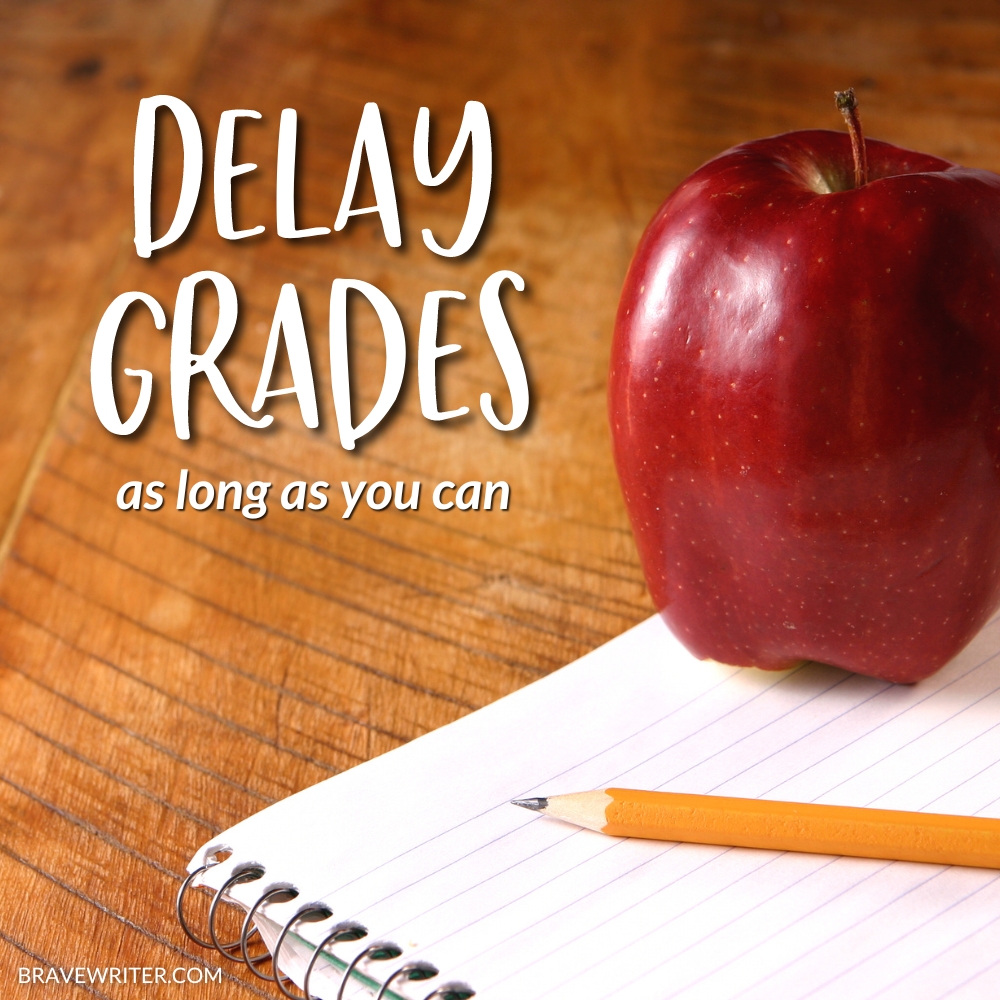
Homeschool is no place for grades (unless you are making a transcript for college applications).
That’s a strong absolute statement—the sort I refrain from making on this page. If you are using a grading system for a reason that makes sense in your family, please don’t take this post as an indictment of that practice. You do you!
For the rest of us—for homeschoolers who ask me regularly about how to “grade” writing—I offer you the following thoughts.
Thoughts on Grading
Letter grades (scores) in years K-8 are irrelevant to your children. We parents are used to the hang-over of traditional school where our parents were able to determine if we were performing adequately by the report card at the end of the semester.
You live with your children as they learn. You know if they know how to read, how to spell, and how to calculate. You know where they get stuck on the times tables and when they surge ahead to mastery.
The goal isn’t to measure and label the achievements of your child with a value judgment (grade). Rather, your job is to identify the areas of growth and to establish a trajectory for continued skill acquisition. If you become concerned that your child is struggling specifically in an area (you see little change in the course of an entire year of consistent, kindly supported effort), you may want to ask your peers or an expert if they would “worry yet” about a learning disability or some other impediment to natural growth.
I still wouldn’t grade that child. Grades forge an “outside-in” identity—either “I’m not as good as others,” or “I’m way better than others.” Each of those identities is flawed and unhelpful to your child’s unique educational path. The child is not evaluating self based on his or her own curiosity and skill strength from within. Rather, grades drive the child to either feel discouraged (I can’t learn this) or sometimes to feel overly self-confident (I already know this; Why do I have to keep reading/growing/studying?).
The Best Feature of Home Education
Curiosity about a subject area is the best feature of a homeschool education. A child can go as far as they like. There isn’t an arbitrary end when a grade has been assigned, as though the study of the subject is confined to a school term and is now complete. Rather, topics and skills blend together, weaving in and out of each other, informing one another, for the duration of the home education lifestyle.
This is why it is difficult to explain to other friends and family how homeschooling works. Your children don’t identify with “going up a grade level” or “finishing math” in the same way traditionally schooled children do. The end markers aren’t there in the same ways.
But this is all to the good! You really can let Ancient Rome take over your homeschool for 18 months because in it, you’ll discover math, science, literature, spelling, grammar, foreign language, mythology, art, religion, and (obviously) history! There’s no “discreet unit” about Ancient Rome that lasts 16 pre-planned weeks with objectives to cover and tests to prove you are finished. There is only learning and exploring as long as Ancient Rome fascinates and gets the job done (leading your children into a glorious “science of relations” between all subject areas).
As long as those connections are happening, you are in the homeschool zone where learning is experienced and validated by how engaged your children are in interesting subject matter.
High school is a time when you may assign grades. But let me throw out a word of caution here. Most colleges/universities have little regard for the grades of a homeschooling parent. They are focused much more on the standardized tests (ACT, SAT) that either validate or invalidate the homemade transcript.
That should reassure you.
You don’t have to suddenly become a scrupulous parent-teacher where you give unnecessarily harsh grades to your child to “prove” you weren’t biased.
Nor should you become the mom who overlooks a child’s performance in order to give all “As.”
What you want to do is give As for completion of work and mastery of the material insofar as you can measure that. Don’t labor over it. Bs are fine too.
Then make a transcript that has both grades (GPA) and course descriptions. The transcript should match the SAT/ACT score. In other words, don’t pretend your child did Honor’s level work and is a 4.5 GPA student if the SAT and ACT score are average (in the 50-70%).
Your child has had an avant-garde education. Focus on that in the application. Don’t try to make your kids look like they went to public school. Major on the unique experiences, reading, and areas of expertise they have cultivated while home educated. THAT’S their ticket to college.
And the essay: make sure it’s a winner!
Bottom line: grades are school’s domain. Homeschool is built from different bricks. Focus on the strengths of homeschool and let go of the tools of traditional school. You’ll be glad you did.






















